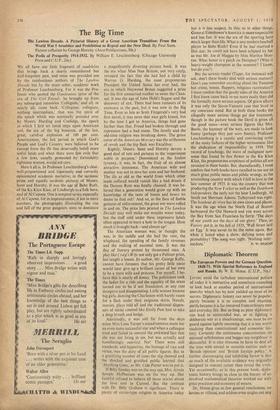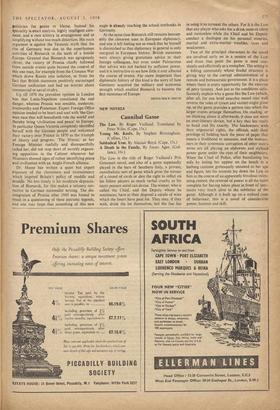Diplomatic Theorem
The European Powers and the German Question, 1848-71. With Special Reference to England and Russia. By W. E. Mosse. (C.U.P., 50s.) LIVING amid the turbulent international politics of today it is instructive and sometimes consoling to look back at another period of international anarchy which has by now yielded up most of its secrets. Diplomatic history can never be popular, partly because it is so complex and exacting, partly because it is far removed from ordinary men and everyday life. But so long as poor diplomacy can lead to unintended war, or to fighting a deliberate war at a disadvantage, one must be on guard against lightly assuming that it is less worth studying than constitutional and economic his- tory. Certainly the continuous concentration on national selfishnesses and beggar-my-neighbour is distasteful. It is also tiresome to have to deal all the time with unreal or mutable entities such as 'British opinion' and 'British foreign policy.' A further discouraging and inhibiting factor is that so much of the available evidence was originally designed to conceal rather than reveal the truth. Yet occasionally, as in this present book, diplo- matic history brings us close to the beauty of an involved mathematical theorem worked out with great precision and economy of means.
Dr. Mosse gives us few general conclusions, no heroes or villains, and seldom even singles out any
politician for praise or blame. Instead his speciality is exact analysis, highly intelligent com- ment, and a rare artistry in arrangement and in simplifying without too much distortion. His main argument is against the Teutonic myth that the rise of Germany was due to the superhuman activities of Bismarck in the teeth of a hostile Europe.. Granted that Bismarck was egregiously clever, the victory of Prussia chiefly followed from outside events quite beyond the control of this one man, for example from the Crimean War which drove Russia into isolation, or from the fact that British statesmen positively encouraged German unification and had no worries about commercial or naval rivalry.
Up till 1870 the prevalent opinion in London was that Louis-Napoleon constituted the real danger, whereas Prussia was sensible, moderate, trustworthy and Protestant. Expert. Foreign Office opinion tended to be heart and soul with 'the Ger- man race that will henceforth rule the world' and thereby bring 'civilisation and peace' to Europe. In particular Queen Victoria completely identified herself with the German people and welcomed their victory over France in 1870 as the triumph of liberty and progress. 'The M issus,' as her Foreign Minister ruefully and disrespectfully called her, did not stop short of secretly organis- ing opposition in the Cabinet whenever her Ministers showed signs of rather identifying peace and civilisation with an Anglo-French alliance.
Dr. Mosse has written a quiet but expert exposure of the clumsiness and inconsistency which inspired Britain's policy of meddle and muddle. No less timely is his moderate deprecia- tion of Bismarck, for this makes a salutary cor- rective to German nationalist writing. The dis- integration of Prussia after 1945 was bound to result in a questioning of these patriotic legends, and one may hope that something of this new
angle is already reaching the school textbooks in Germany.
At the same time Bismarck still remains inescap- ably the cleverest man in European diplomacy, and one is left feeling not so much that he himself is diminished as that diplomacy in general is only marginal in European history. British statesmen were always giving gratuitous advice to their foreign colleagues, but even under Palmerston that advice was not backed by sufficient power, and it is instructive to see how little it ever affected the course of events. Far more important than diplomatic history of this kind is the story of how Germany acquired the military and economic strength which enabled Bismarck to become the first statesman of Europe.
DENIS MACK SMITH































 Previous page
Previous page